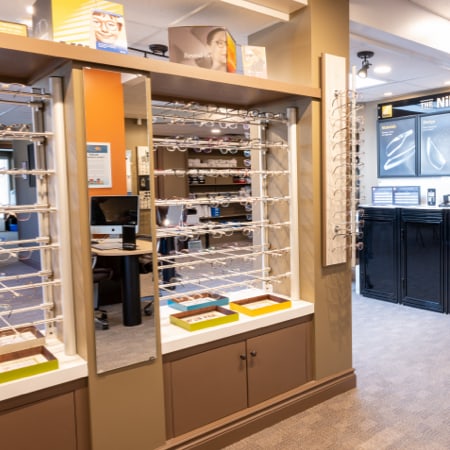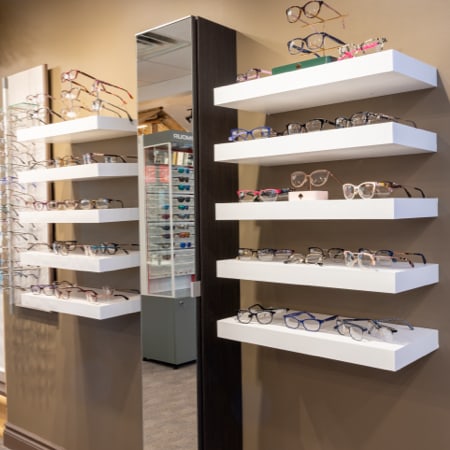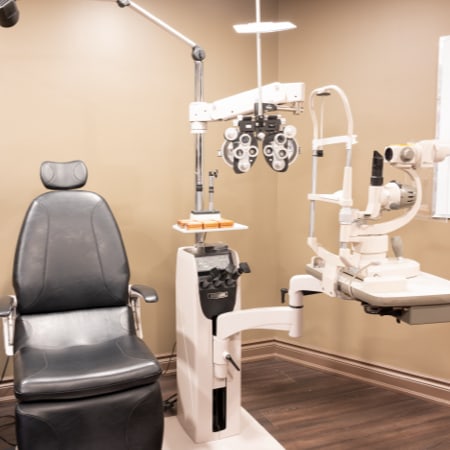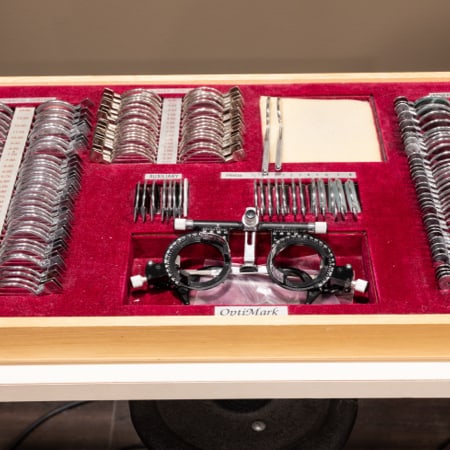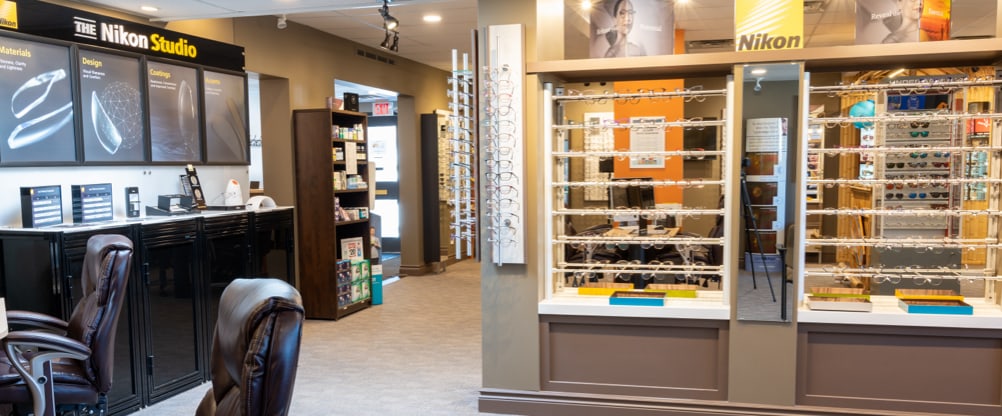One of the screening questions we ask during a routine eye exam is whether your family has a history of any eye diseases or conditions.
The reason we ask is simple: certain eye conditions have a hereditary component and glaucoma is one of them.
Research tells us that immediate family members of people with glaucoma have a significantly higher risk of developing this condition. With that said, a family history doesn’t guarantee you will develop glaucoma. It’s just one piece of a complex puzzle.
You cannot prevent glaucoma indefinitely, but you can take proactive measures to lower your risk. Staying on top of routine eye exams is one of them.
Glaucoma & Your Vision
Glaucoma is a group of eye diseases that damage the optic nerve, often because of high eye pressure (intraocular pressure, or IOP). Your optic nerve is a structure that transmits visual information from your eyes to your brain, allowing you to see.
When glaucoma damages the optic nerve, it usually starts with peripheral (side) vision loss, often going unnoticed until the condition becomes severe.
Delaying glaucoma management takes a toll on your peripheral vision. Your field of vision becomes much more confined, almost as if you’re looking through a straw. Without proper management, damage to the optic nerve continues, putting you at risk for complete vision loss.
The challenge with detecting glaucoma early lies in its gradual progression. Many people might not notice vision changes until significant damage has occurred. This is why regular eye exams play a pivotal role in early detection and management.
The Role of Genetics in Glaucoma
Anyone can develop glaucoma, but if you have a family history, your risk of developing this condition increases significantly.
Research shows that first-degree relatives (like parents or siblings) of someone with glaucoma are 4–9 times more likely to develop it themselves. This is particularly true for primary open-angle glaucoma (POAG), the most common form of the disease.
On top of that, certain genes contribute to a greater risk of developing glaucoma, particularly in cases of POAG and congenital glaucoma. Mutations, for example, in the MYOC gene (for myocilin) have been linked to a higher risk of early-onset glaucoma.
But genetics alone don’t seal your fate. It’s rarely a single gene but rather a combination of genetic and environmental factors that contribute to glaucoma development. This can explain why family members have glaucoma while others remain unaffected, even with similar genetic markers.
A family history is just one component of a much larger puzzle. A better way to look at a genetic predisposition to any health condition is as a push in a certain direction, not a guarantee. We are more than our genetics. We’re also a product of our environment.
Beyond Genetics: Risk Factors for Glaucoma
Having relatives with glaucoma doesn’t mean you’ll necessarily develop it. Many other risk factors come into play, including:
- Age: With age comes changes to your eyes. Your risk of glaucoma (which falls under age-related eye problems) increases, especially after 60.
- Ethnicity: People of African, Asian, and Hispanic descent have a higher risk of developing certain types of glaucoma.
- Medical conditions: Diabetes and high blood pressure are associated with a higher likelihood of developing glaucoma.
- Eye injuries or surgeries: Prior injuries or eye surgeries can increase intraocular pressure, raising the glaucoma risk.
- Extensive corticosteroid use: Using corticosteroid medications, particularly in eye drop form, can lead to elevated eye pressure.
Even if glaucoma runs in your family, focusing on your overall health and eye care routine can go a long way in reducing your risk.
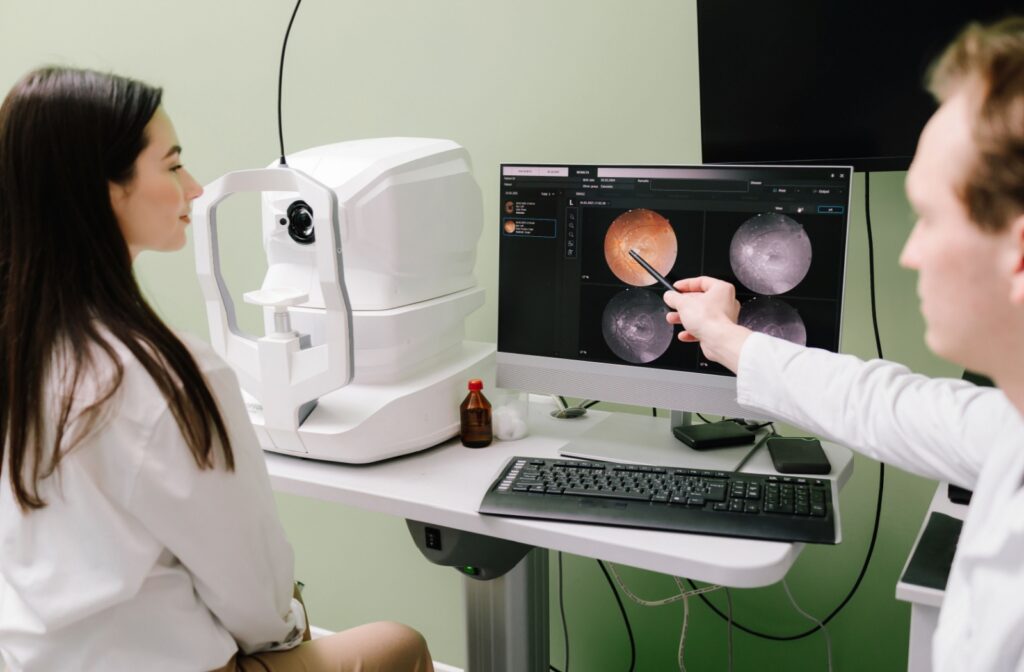
Lower Your Risk of Glaucoma
There’s no surefire way to prevent glaucoma, but there are effective strategies to lower your risk or slow its progression. Prevention in this case isn’t about eliminating the condition entirely, but about proactive steps to protect your eye health.
Think of it this way: we cannot control our genetics, but we can control our lifestyle and habits to safeguard our sight. Here’s how:
Schedule Regular Eye Exams
A comprehensive eye exam is your first defence against undetected glaucoma. If you’re at risk for glaucoma, your optometrist may wish to schedule regular screenings.
Optometrists can measure your eye pressure, assess your optic nerve health, and identify early warning signs. Catching glaucoma early can prevent severe damage.
Manage Chronic Health Conditions
If you have diabetes, high blood pressure, or other chronic health issues, keeping them in check will reduce your glaucoma risk. Work closely with your family doctor and optometrist to manage these conditions and support your overall health and wellness.
Protect Your Eyes
Injuries from high-impact sports or hazardous work can increase eye pressure and lead to secondary glaucoma.
Just as you wear a helmet to protect your head while biking or skiing, protective sports eyewear or safety goggles can shield your eyes from injury, debris like metal scraps, or irritants like chemicals.
Maintain a Healthy Lifestyle
- Exercise regularly (but avoid strain-heavy exercises like weightlifting if advised against it).
- Eat a balanced diet rich in eye-healthy nutrients like vitamins A and C and antioxidants.
- Reduce caffeine intake, as excessive caffeine may elevate eye pressure.
- Quit smoking! Your lungs and your eyes will thank you.
Stay Alert to Symptoms
Even though many types of glaucoma develop without noticeable symptoms, stay alert for early warning signs, such as:
- Halos
- Nausea
- Blurry or fluctuating vision
- Headaches or eye pain
If you notice any of these symptoms, or your vision feels “off”, visit your optometrist immediately. Early detection facilitates better results and helps preserve your eyesight.
Take Control of Your Eye Health
Glaucoma may be irreversible, but timely diagnosis and treatment can help preserve your vision and prevent the disease from worsening. Whether you have a family history or not, being proactive with your eye health fosters better outcomes for years to come.
Knowing your family’s medical history is a privilege. Speak to your relatives and inform us if any eye conditions or diseases run in your family. It can make a huge difference.
At Orillia Optometry, we’re your trusted partners in eye health. Connect with our team to book your routine eye exam.









